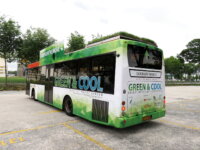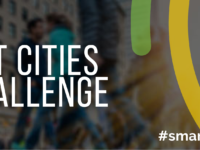This innovation represents Asia’s first public bus with a live green mat on top. The Green Roof Bus was developed for:
1. Awareness: To remind people of the flora and fauna that are sacrificed for dozens of new building. By using public transport, the outreach was wider and also serves to remind the public that public transport greatly reduces your carbon footprint versus owning a car.
2. Bus temperature reduction: both internal and external and in turn, reduction of fuel consumption.
Innovation Tag: Citizen Engagement
An Economic Reform Governance Model to reform design and delivery of citizen-and business-centric public services was introduced in 2016. Aim of the Model was to eliminate barriers, ensure transparency, develop digital public services and expand competitiveness through increasing engagement of civil society and businesses in the reform process. Implementing 136 reform initiatives by passing 55 legal acts enabled the government to create more favorable social-economic opportunities for citizens.
The Smart Cities Challenge is a competition open to local governments across Canada. Launched in 2017 as the federal government’s first prize-based funding program, it invites communities to solve problems and improve quality of life for residents by leveraging connected technologies and data. The Challenge incentivizes communities to approach problem-solving in creative ways by working with residents, building partnerships, experimenting and taking risks.
In order to respond to the surge in unprecedented pandemic of COVID-19, Korean government swiftly developed the Epidemiological Investigation System based on Smart City Data Hub technology. It is designed to help officials quickly trace transmission routes and places through real-time data analysis such as mobile information. This system reduced the time for investigation from 24 hours to less than 10 minutes, enabling the containment of the pandemic in early stage and effective quarantine.
TrueMed will change the brand protection market with modern AI based software approach for detecting originals and counterfeits around the world. TrueMed’s innovation is the next generation method for rapidly detecting goods, at any point of distribution, by customs or even consumers. It can be used by brand owners and authorities in global and cross-border collaborations. It is 100% non-additive, hence very cost-effective, agile, and capable of being adopted to different use cases.
Bullying is one of the main social challenges in Lithuania with about 30% of children becoming victims of bullying few times a week. Most of them don’t report the incidents while school officials often can’t recognize and effectively provide help for both victims and bullies. “Patyčių dėžutė” is a mobile app which allows children to anonymously report bullying accidents, while REAGUOK.LT is a e-learning platform for teachers with all the relevant information about how to respond to…
Six European partners are collaborating in the framework of the Interreg Europe Program for the implementation of DIALOG. The project has the objective of improving the effectiveness of innovative policies for regional competitiveness through the involvement of local stakeholders and citizens in policy and decision making processes. This involvement will be crucial to address common needs and face mid- and long-term challenges related to sustainable territorial development.
The EGTC GO represents an instrument to unlock cross-border potential for innovation, competitiveness, and sustainable growth. It promotes innovation in local governance through a supra-regional method to solve cross-border challenges - administrative and legal burdens – in order to provide concrete solutions for its territory and citizens. Flagship cooperation projects on Health, Culture and Social Innovation are key examples of the innovative added-value of the EGTC GO.
Viet Nam has suffered a drastic decrease in mangrove forests in recent decades driven by the growth of aquaculture. The governments of the Republic of Korea and Viet Nam have decided to resolve this issue through cross-sector collaboration between the forestry and fisheries sectors of both governments. Through this cooperation, the two governments will help local people restore and sustainably manage mangrove forests while also improving their livelihoods through eco-friendly aquaculture.
NATAL’s Helpline was developed 20 years ago to provide an accessible and destigmatized method for those traumatized by terror and war. The Helpline provides state-of-the art trauma-informed mental health care. Twelve years later, in partnership with Pastor Harris and his community, the model was adapted to help Chicagoans cope with trauma from urban violence. This international partnership trained 40 caregivers to help hundreds of callers annually, resulting in healthier outcomes and…






